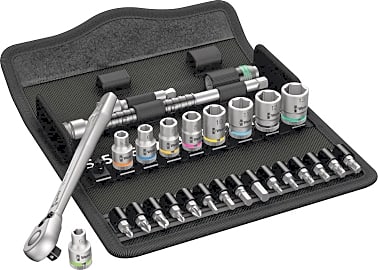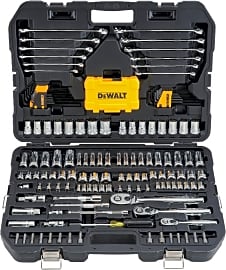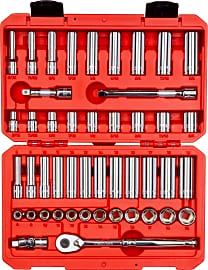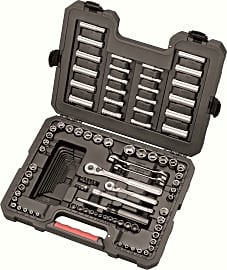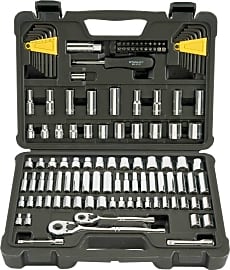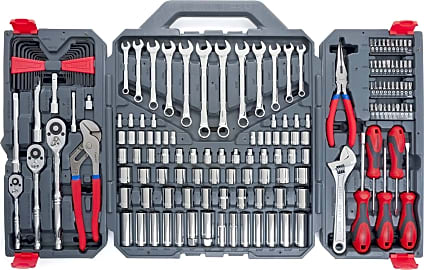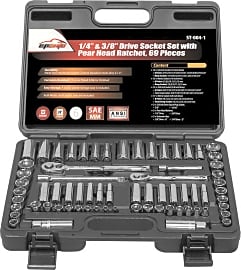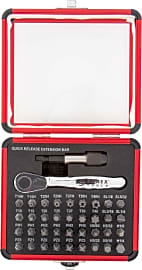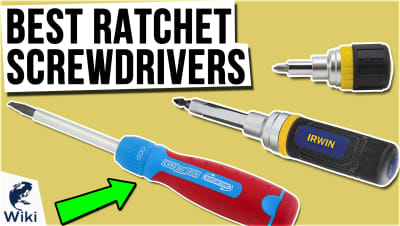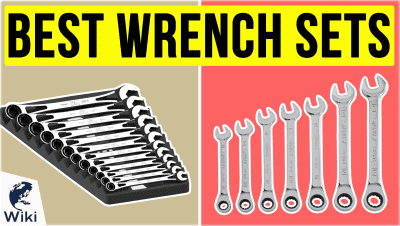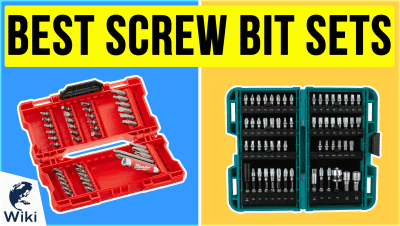The 10 Best Ratchet Sets

This wiki has been updated 43 times since it was first published in August of 2015. Whether you are a home DIY-er or a professional mechanic, you can ensure you always have the right socket for the job on hand with one of these ratchet sets. We've included budget-priced options perfect for occasional repairs around the house, through to comprehensive and durable collections that would be suitable for everyday use in a professional garage or workshop. When users buy our independently chosen editorial choices, we may earn commissions to help fund the Wiki.
Editor's Notes
July 23, 2020:
Removed the Bostitch BTMT72287 and the Stalwart 75-HT3014 because of availability issues. Added the Williams 50619 and the Wera Zyklop 8100.
When you're buying ratchets and sockets and you plan on using them more than just once or twice, its very important that you get the best you can in accordance with your budget. I've given many budget tools a shot but you end up paying more in the long run when they fail. I like the Williams because the teeth on the pawl and gear are coarse enough that you can really beat up on it without worrying that they'll strip. While you're not supposed to hit ratchets with a hammer, it is more or less unavoidable. Even so, the teeth are also fine enough that you can ratchet within fairly tight angles.
The Wera Zyklop 8100 is a nice set that comes in a surprisingly compact pouch - it will easily fit in your glove box. The ratchet handle has that classic Wera feel that you get with their screwdrivers. Its most appealing feature to me is the knurling on the sockets and extensions. I'm not sure why more companies haven't implemented this into their designs since it makes it a lot easier to finger tighten and loosen when you have to. The only problem I have with the Wera is that the sizes are laser etched and not stamped. This is a problem that is common in hand tools. Laser etching doesn't last and they rub off with time and use and then you have to guess the socket sizes (I refuse to memorize color coding).
May 01, 2019:
In choosing socket sets, we sought out versatile collections containing at least 30 pieces. Because of the size of many of these kits, professional mechanics can count on finding a suitable option for their needs in this list. Many of these choices come with "extra" items, too, such as wrenches, screwdriver bits, and other useful tools and accessories.
The Stanley 92-839 was removed due to availability concerns and replaced with the superior STMT71652, also from Stanley. Similarly, the Tekton 13101 has been replaced with an updated set, the SKT15301, and the EPAuto 40-Piece was removed and replaced with the 92-824 from the same brand.
What Exactly Is A Ratchet Set?
If you consider that you don’t have to reposition this type of wrench constantly, you might see why ratchet sets are so handy.
Whether you’re working under the hood of a car or under your kitchen cabinet, it’s likely that you’ll have a ratchet set by your side. The term ratchet set is actually something of a misnomer, however, because this term usually refers to what you would more properly call a set of ratcheting socket wrenches.
In fact, the word ratchet by itself describes any device employing the system of teeth that allows for uni-directional motion. A ratchet can be added to several types of common tools, including screwdrivers and regular wrenches. There are also ratcheting models of tools the home repairperson or garage mechanic may not ever need, such as pipe cutters and wire crimpers. Despite there being plenty of ratcheting tools, the ratcheting socket wrench is probably the most widely used and familiar, so it’s come to be known simply as a ratchet.
So, how does a ratcheting socket wrench work? Essentially, this tool has two crucial pieces that work together: the handle, which contains the ratchet, and the socket. Once you place the socket over the fastener, you turn the handle clockwise to tighten it. Thanks to the ratcheting mechanism, swinging the handle back prepares it to tighten again, so you won’t need to pick up the wrench and reposition it, as would be necessary with a regular model. Loosening a fastener is possible, too, thanks to a switch on the handle that changes the direction.
If you consider that you don’t have to reposition this type of wrench constantly, you might see why ratchet sets are so handy. A ratchet is also excellent for jobs that require tightening or loosening a fastener that’s in a tight spot because they make the work go much more quickly and easily. And since the socket fits entirely over the fastener, it’s less likely to slip, as can happen with a regular wrench.
Variations Of Note
There’s no shortage of ratchet sets for you to choose from, since manufacturers from small to large produce an impressive variety of these tools. As you might imagine, the biggest difference you’ll find relates to dimensions, which includes the size of the ratchet handle and sockets, as well as the number of pieces in a set. All sockets won’t fit on all ratchet handles, since the latter come in different sizes, referred to as the drive size. The most common drive sizes are 1/4-inch, 3/8-inch, 1/2-inch, and 3/4-inch.
If you need a wrench often, a set with many sizes would probably be your best bet.
Sockets are measured in both metric and standard sizes, which correspond to the size of the fastener over which the socket will fit. You’ll find a wide range of these for each drive size. If you need a wrench often, a set with many sizes would probably be your best bet. You’ll also see that sockets have different interior shapes; the most common are six-point and the 12-point. A six-point interior requires that the fastener be the correct size for the socket, whereas a 12-point, since it’s more round inside, leaves a little wiggle room. It’s easier for less experienced users to choose the wrong 12-point and accidentally strip a fastener head, so many experts recommend starting with a 6-point set.
Sockets also vary in their length; they can be shallow or deep. The former, also called low-profile, fit in tighter spaces, but they aren’t useful in some instances. For example, if a nut is substantially lower than the top of the bolt, then a shallow socket won’t be able to reach it. For this reason, you may want to select a ratchet set that does have at least a few deep sockets.
Beyond size, there are a couple of features to look out for that make a higher-quality ratchet set. The first of these is the materials from which it’s made. Thanks to its toughness, chrome vanadium steel is a common choice. Next is the durability of the case. It’s not uncommon to accidentally drop a tool on the case or even drop the whole thing on the floor, so you’ll probably want a case that can withstand some abuse. Finally, look for sets that have the size stamped on each socket to make both selection and cleanup much faster.
A Brief History Of The Ratchet Set
The invention of the wrench is attributed to Solymon Merrick, who received a patent for this tool in 1835. It’s probable, however, that this type of tool existed long before Merrick applied for a patent, especially since the idea behind the wrench is remarkably simple. The next large development occurred in 1863, when J.J. Richardson received a patent for a ratcheting socket wrench that would make using these tools in tight spots more convenient. Then, in 1913, Robert Owen Jr. received a patent for "new and useful improvements” to ratchets.
Unbeknownst to Roberts, however, the company was planning to manufacture a large quantity in expectation of successful sales.
The story of the ratchet truly becomes interesting, though, in 1964, when 18-year-old Peter Roberts invented the quick-release ratchet. Then an employee of Sears, Roberts sold the company the rights to the patent for ten grand. Sears had informed Roberts that their research wasn’t promising; it suggested that the invention would not be profitable or in demand. Unbeknownst to Roberts, however, the company was planning to manufacture a large quantity in expectation of successful sales. The company’s lawyer also belittled the originality and usefulness of the invention to Roberts.
When Roberts later learned that the wrench had sold over 500,000 units in the first nine months, and that Sears was marketing the device as a breakthrough, he was (probably rightfully) upset. Thus, in 1969, a long legal battle began that eventually worked its way all the way up to the Supreme Court. Despite many judges weighing in, many verdicts, and many appeals, no final decision could be reached. Finally, 20 years later, in 1989, just at the start of yet another new trial, Sears settled with Roberts for an amount rumored to exceed eight million.



